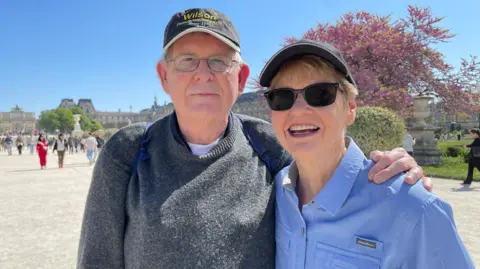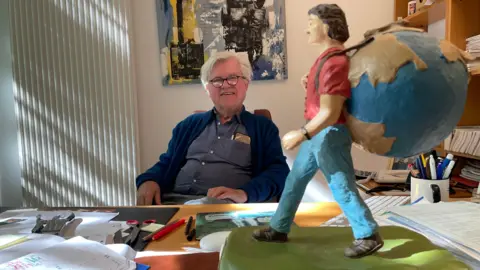'People might treat us differently': Trump era leaves US tourists in Paris feeling shame
 BBC
BBCStrolling in bright sunshine across the immaculately raked gravel of Paris's Tuileries gardens, Barbara and Rick Wilson from The Dalles, Oregon, were not exactly in disguise. But earlier that morning, on their very first trip to France, Rick, 74, had taken an unusual precaution.
Before leaving his hotel, he'd taken a small piece of black tape and covered up the Stars and Stripes flag on the corner of his baseball cap.
"We're sick about it. It's horrible. Just horrible," said Rick, as he and his wife contemplated the sudden sense of shame and embarrassment they said they now felt, as Americans, following President Trump's abrupt moves on global trading tariffs.
Barbara, 70, even had a Canadian lapel pin in her pocket – a gift from another tourist - which she thought might come in useful if further subterfuge proved necessary.
"I'm disappointed in our country. We are upset about the tariffs," she explained.
A few yards away, towards the crowds gathering outside the Louvre Museum, another American couple was also trying to keep a lower profile than usual. Chris Epps, 56, an attorney from New York, had decided he would dress a little differently on today's tour.
"No New York Yankees hat. I left it in the hotel. People might come up to us, treat us differently. But so far, so good," he added.
 Getty Images
Getty ImagesAs the world grapples with the implications of Donald Trump's see-sawing quest to upend the global trading system, the impacts are being felt not just on stock markets and businesses and investment funds, but in subtler ways too, and not least here in France, a country that continues to attract vast numbers of tourists from North America, and which has a centuries-old, close, and sometimes testy relationship with the United States.
To be clear, there are no indications that Americans are any less welcome here than before. Our interviews with a random selection of tourists were also carried out shortly before President Trump reversed some of his tariffs.
Nonetheless, the shock and anger generated in Europe by events of the past week have added fuel to perceptions of a much larger transatlantic rift – of a shifting of the tectonic plates of international relations.
It is early days, of course. Americans are far from united about their government's actions and much of the evidence for changing sentiments is anecdotal.
But there are already some discernible effects on travel, tourism, academia and other fields.
"It's a big drop," said Philippe Gloaguen, the founder of France's most prestigious travel guides, Le Guide du Routard, sitting behind a cluttered desk in Paris and noting that orders for his books about the US had fallen by 25% so far this year.
Not that Gloaguen was complaining. Quite the opposite, in fact.
"I'm very proud of my customers. They are young, well-educated, and very democratic. This was the truth for Putin… and for China. We know when there's a dictatorship going on in a country," he said, arguing that his French readers were beginning to view America in a similar light.

"They don't want to spend their money in the United States," Gloaguen continued, framing his publication as a sort of global democratic weathervane.
He noted that the abrupt fall in US sales was balanced by a rise in sales of books about "Canada and other countries."
Other evidence from the travel industry is beginning to back up the idea of a growing disenchantment with the United States. The forecasting company, Oxford Economics, is already predicting an 8.9% drop in the number of French people travelling to the US this year compared with 2024.
Another recent analysis – of French expatriates living in the US – found that a remarkable 78% of them are now "particularly pessimistic" about their future in the country, while 73% of people polled within France, in March, believed the US was no longer an "ally".
Over a morning coffee in a Parisian café, Nicolas Conquer – an enthusiastic Trump supporter and dual French-American citizen who leads the Republicans Abroad Paris branch – acknowledged "some volatility" because of the tariffs but argued that a "media narrative" was creating a false impression of strained transatlantic relations.
"I'm still standing my ground... reminding people that France and the US have been the oldest allies," Conquer said, adding that any negative reaction to Trump's America First agenda was based on a "childish or immature" view of international relations.
"Everyone knows that we have to have strong sovereignty, strong patriotism, and that… as Trump supporters go for 'America First', we would expect that… European governments would also promote UK first, Germany first, France first," said Conquer.

But concern about the Trump administration's recent actions and rhetoric – not just in relation to tariffs but also regarding Ukraine and Greenland – is widespread across France and hard to miss. Politicians, newspapers and television talk shows have all been busy dissecting the changes, often in a tone of bitter disillusionment.
In practical terms, the result has sometimes been to offer support to perceived victims of the Trump administration, with French scientific institutions, backed by the French government, beginning to offer places to American researchers who've lost their jobs due to cuts in government funding.
Elsewhere there are indications of nervousness about simply travelling to the US. A prestigious social studies institute in Paris recently sent its students a warning, following reports of foreigners being questioned about their political beliefs and refused entry.
"We urge you to be extra vigilant when travelling abroad. It is important not to travel with your usual equipment but to use a shared computer containing only data necessary for your stay and no sensitive data. During border checks, some security services may require the unlocking of digital devices to view information, including private information," wrote a professor at EHESS, in a group email seen by the BBC.
Relations between Paris and Washington have survived many previous shocks – as, for instance, American taunts about "cheese-eating surrender monkeys" following France's decision not to participate in the 2003 invasion of Iraq, or the more recent spat over calls to return the Statue of Liberty.
But France's friendship with the US has never been as unconditionally "special" as that claimed by, say, the British. The French may adore Hollywood cinema, country music and the allure of the American Dream, and celebrate ties that date back to America's war of independence, but they have kept some distance too - shunning what's known here as "Le Woke-isme" and, today more than ever, celebrating President De Gaulle's determination to build an entirely French-owned nuclear deterrent separate from both Nato and the US.
"The American people remain our friend, but [Trump] is no longer our ally," the former French President François Hollande announced recently.
"It's definitely a relationship of 'love' and not always 'like,'" said Kerry Halferty-Hardy, the President of the American Club of Paris, citing the ambivalent lyrics of the famous Serge Gainsbourg song, "Je t'aime - moi non plus."
Looking out of her Paris apartment towards the Eiffel Tower, Halferty-Hardy argued that the shared values of liberty and the Enlightenment linking France and the US "are not easily dislodged and certainly not on the basis of one administration," but she acknowledged that "no one can ignore what they're seeing in the headlines."
